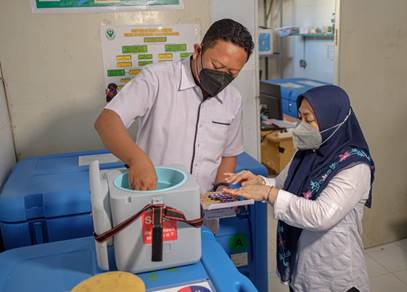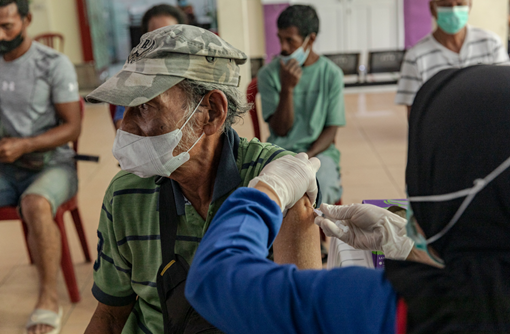Indonesia has achieved high coverage for the first two of COVID-19 vaccine doses. The country grapples, however, with a considerable drop-off in the administration of booster shots. Navigating the uncertain course of the COVID-19 pandemic poses a significant challenge for Indonesia, particularly given the threat of potential virus mutations that could amplify its virulence. To effectively shield its population, it is crucial for Indonesia to persist with its vaccination efforts, notably by escalating the rollout of booster doses.
While Indonesia’s initial vaccination campaign achieved commendable coverage, interest in booster doses is waning, particularly among the vulnerable older population. The declining interest in vaccination among the general population, coupled with the decreasing number of COVID-19 cases, has further impeded efforts to increase booster dose coverage. As the uncertainty of the COVID-19 pandemic persists, the shift from a vaccination campaign mode to an integrated, routine immunization approach within Primary Health Care is crucial.
In a mission to navigate the challenges of Indonesia's COVID-19 vaccination rollout, WHO conducted a post-introduction evaluation (cPIE). This audit identifies several areas to improve in planning and coordination, funding allocation, demand generation, and the management of a digital transition.

Health workers prepare vaccines in the Parigi Moutong District Health Office’s Pharmacy warehouse, Central Sulawesi. Credits: WHO/Iqbal Lubis
WHO’s analysis found a pressing need for more effective planning and coordination of the COVID-19 vaccination programme. It underscored the importance of involving multiple non-traditional stakeholders and clarifying their roles and responsibilities. Furthermore, an effective funding strategy must consider the final stages of vaccine delivery, ensuring that the last miles of vaccine delivery are not neglected. In addition, there is a need to boost the demand for vaccines and enhance communication strategies, particularly at local levels, this includes ensuring that people are aware of the importance of vaccination, and that they have access to vaccination services. Finally, an unexpected challenge identified in the report was the struggle faced by health workers adapting to the digital monitoring and evaluation system, despite its efficiency.
Based on these cPIE findings, WHO recommends that the Indonesian government begin planning to incorporate COVID-19 vaccinations into the routine services available from the community health centre, known as Puskesmas, through its older adult’s outreach programmes (namely Posbindu PTM and Posyandu Lansia). These centres should prioritise the older population, who are susceptible to COVID-19 and, at present, have the lowest vaccination rate. To achieve this, the Indonesian government, at both central and local levels, will need to ensure appropriate human resources, enhance the cold chain capacity, and develop an effective contingency plan to ensure that the delivery of current services is not disrupted.

COVID-19 vaccination session observed during the post-introduction evaluation in Ambon City. Credits: WHO/Nyimas Laula
With its size and population diversity, Indonesia faces a unique challenge in tackling COVID-19. The cPIE findings present invaluable insights that can guide the government towards a more effective and equitable vaccination strategy for the future. This is particularly crucial as Indonesia navigates towards the non-acute phase of the COVID-19 pandemic and must counter declining vaccine interest among the general populace and older adults.
The cPIE sheds light on the complexities and prospects of Indonesia’s COVID-19 vaccination programme. In response to these insights, the Indonesian government is steadfast in its commitment to refine the programme and ensure vaccine accessibility for all citizens.
***
The development and dissemination of COVID-19 Vaccination Post Introduction Evaluation is supported by the Ministry of Foreign Affairs, Japan and the Department of Foreign Affairs and Trade (DFAT), Australia.
Written by Rodri Tanoto, National Professional Officer (New Vaccine), WHO Indonesia
